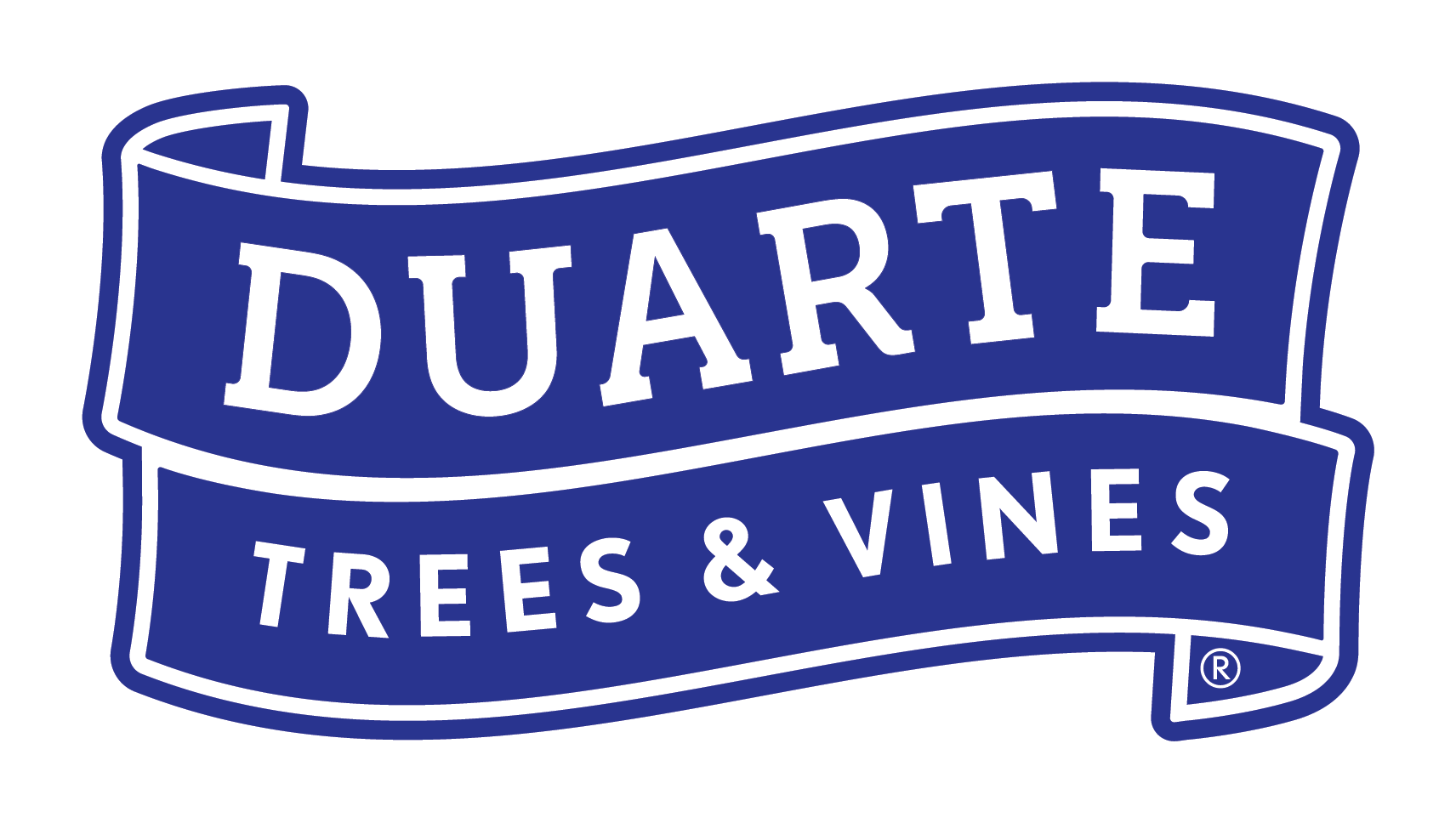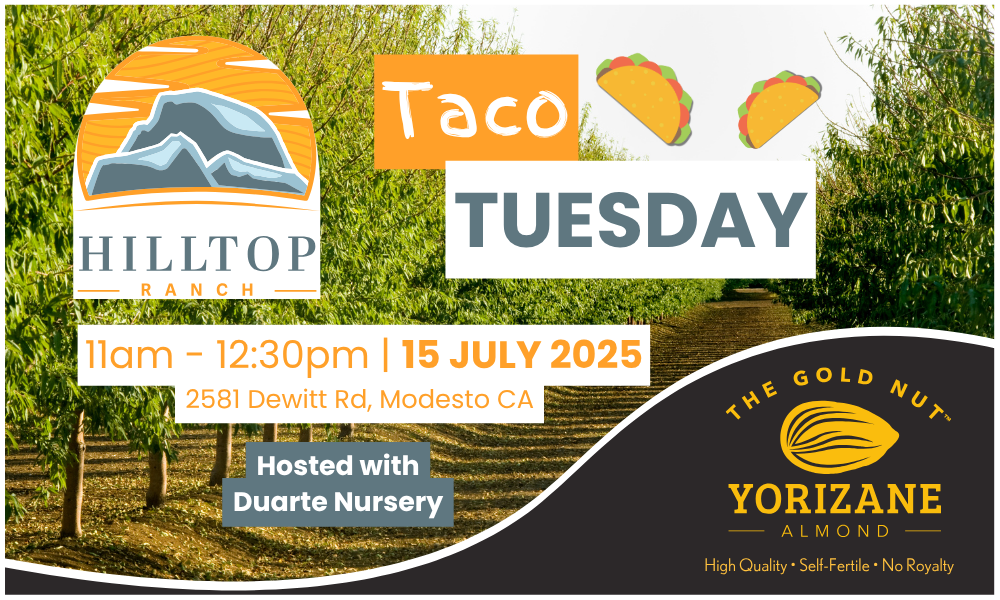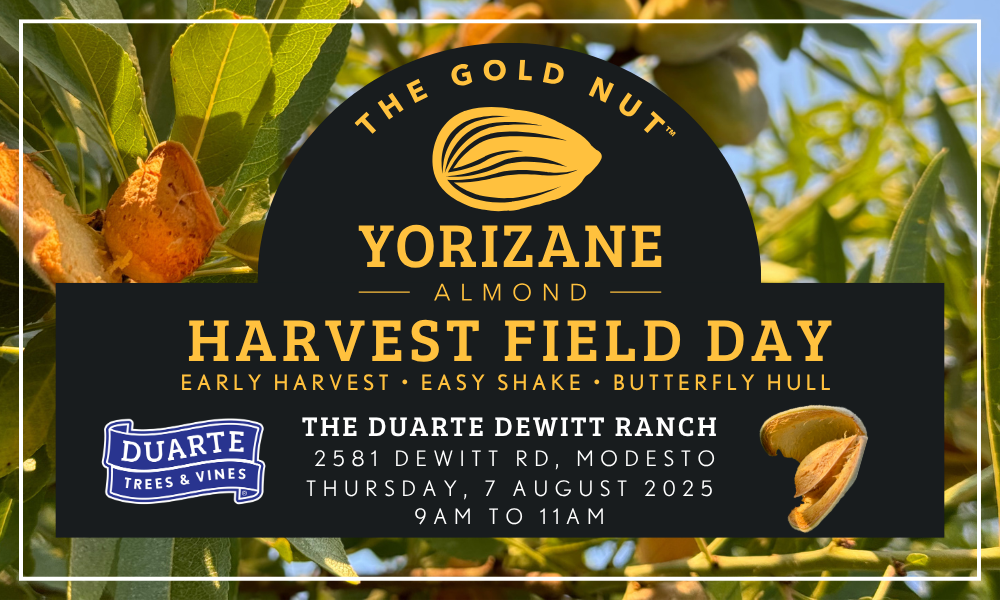Duarte Nursery offers the most complete selection of almond varieties and clonally produced rootstocks. See the new self-fertile Yorizane almond, royalty free and released by the USDA.

Almonds
Almond Rootstock
For more information on almond rootstocks, see the Almond Rootstock Comparison Chart from the UCCE and the Almond Board of California and Roger Duncan’s field assessment of yield efficiency.
Bright's Hybrid®5 (cv. Arthur V) USPP# 18,782-
This almond rootstock is a Peach-Almond hybrid cross. Characteristics of this rootstock are large, hardy, self-sterile, productive, and regular bearing trees. Bright’s Hybrid 5 is commercially useful for almost all prunus species and has an excellent yield efficiency. The rootstock was developed as a first generation using Titan as the selected seed parent and Nemaguard as the selected pollen parent.
Vigor: High
Yield Efficiency: Excellent
Hansen 536 Hybrid-
This almond rootstock is used for Almonds, Peaches, Apricots, and Nectarines. It has excellent anchorage. It’s advantages are that it is more tolerant of salinity, alkalinity, ph, and boron soils, as compared to all other rootstocks. It is moderately resistant to Root-Knot nematodes. It does require deep and well-drained soils. It can be planted year round.
Vigor: Very High
Yield Efficiency: High
Crimea AP-1 (generic equivalent of Krymsk® 86)-
This almond rootstock is compatible with Almonds, Peaches, Plums, and Apricots. It has excellent growth, uniformity, and excellent anchorage for young almond trees. It is a low suckering rootstock, and has moderate vigor. It is not compatible with the Independence variety and has marginal compatibility with Shasta and Monterey.
Vigor: Moderate
Yield Efficiency: Moderate
Krymsk® 86 is a registered trademark of Varieties International, LLC. This product is genetically identical, but is not manufactured or distributed by Varieties International, LLC.
Viking-
This rootstock is a complex hybrid of peach, plum, almond, and apricot. It is slightly more vigorous than Nemaguard with a good tolerance to ring nematode, bacterial canker, salt, and alkaline conditions. It has excellent anchorage.
Vigor: Moderately High
Yield Efficiency: Excellent
Nemaguard-
Nemaguard rootstock can be used for Almonds & Stone Fruit trees. This peach seedling rootstock is root knot nematode resistant, and is moderately vigorous. It is susceptible to root lesion nematode, bacterial canker & oak root fungus. Nemaguard rootstock prefers sandy soils. Currently being replaced by newer, better-suited rootstocks.
Vigor: Moderately High
Yield Efficiency: Moderate
FXA(Flordaguard x Alnem)-
FXA is a new Peach-Almond hybrid released by the USDA. This new rootstock is a Flordaguard and Israeli Alnem cross and has performed well in several rootstock trials. FXA has performed well in marginal soils where salinity and/or boron limits productivity. This is a new almond rootstock and trials are ongoing.
Vigor: Very High
Yield Efficiency: Excellent
Almond Varieties
Yorizane: The Gold Nut™-
Self-fertile, harvests early, blooms same time as Nonpareil. Tree is small-to medium with very high yield efficiency and production. Large nut with a soft shell, low defects, and excellent seal. Trialed in the UCCE Regional Variety Trials since 2014 with outstanding performance, released by the USDA in 2021.
- Top production, excellent quality, no royalty
- Available now!
- Learn More
Aldrich-
Pollinizer for Nonpareil. Harvests 14 days after Nonpareil, and blooms slightly before Nonpareil. Very productive variety, large upright tree. Nut is medium in size hard shelled and well sealed.
Butte –
Harvests 18 days after Nonpareil, and blooms 4 days after Nonpareil. Heavy producer, highest yielding almond variety. Nut is small to medium in size, semi-hard shelled and well sealed.
Carmel –
Harvests 15 days after Nonpareil, blooms with Nonpareil. Trees are heavy and early producers, more upright than Nonpareil. Nut is medium sized soft shelled and well-sealed.
Fritz –
Pollinizer for Nonpareil. Harvests 40 days after Nonpareil, blooms slightly after Nonpareil. Tree is upright and spreading. Nut is medium sized, and semi-hard shelled.
Monterey –
Harvests 24 days after Nonpareil, bloom slightly after Nonpareil. Trees are medium in size, spreading, and vigorous. Nut is large, has a high percentage of doubling, soft-shelled, and well-sealed.
Nonpareil –
Harvests at the end of August, blooms about the 3rd week of February. Considered to be the premier variety in California. Tree is large, upright, spreading and harvests easily. Nut is large; shell is paper thin, and poorly sealed.
Padre –
Harvests 26 days after Nonpareil, blooms 5 days after Nonpareil. Tree is medium in size, upright, and is a good producer with the potential for high yields. Nut is medium sized, hard shelled, and well-sealed.
Price –
Harvests 5 days after Nonpareil, blooms with Nonpareil. Tree is medium in size; upright, vigorous, but has the tendency to alternate bloom. Nut is small to medium in size, plump, and has a paper-thin shell. It also has a moderately high percentage of double kernels.
Sonora –
Harvests 7 days after Nonpareil, blooms slightly before Nonpareil. Tree is medium sized, slightly spreading, has the tendency to alternate bear. Nut is medium sized, shell is paper thin, and poorly sealed.
Wood Colony –
Pollinator for Nonpareil. Harvests 10 days after Nonpareil, blooms slightly after Nonpareil. Tree is small in size, good for close plantings, and similar to Carmel in its spreading scaffold structure. Nut is medium sized, plump, soft-shelled, and well sealed.
Winters –
Harvests 24 days after Nonpareil, blooms with 3 days before Nonpareil. Tree is upright and vigorous. Nut is medium sized, shell is thin, and moderately well sealed. Winters is a new variety released from the University of California.





